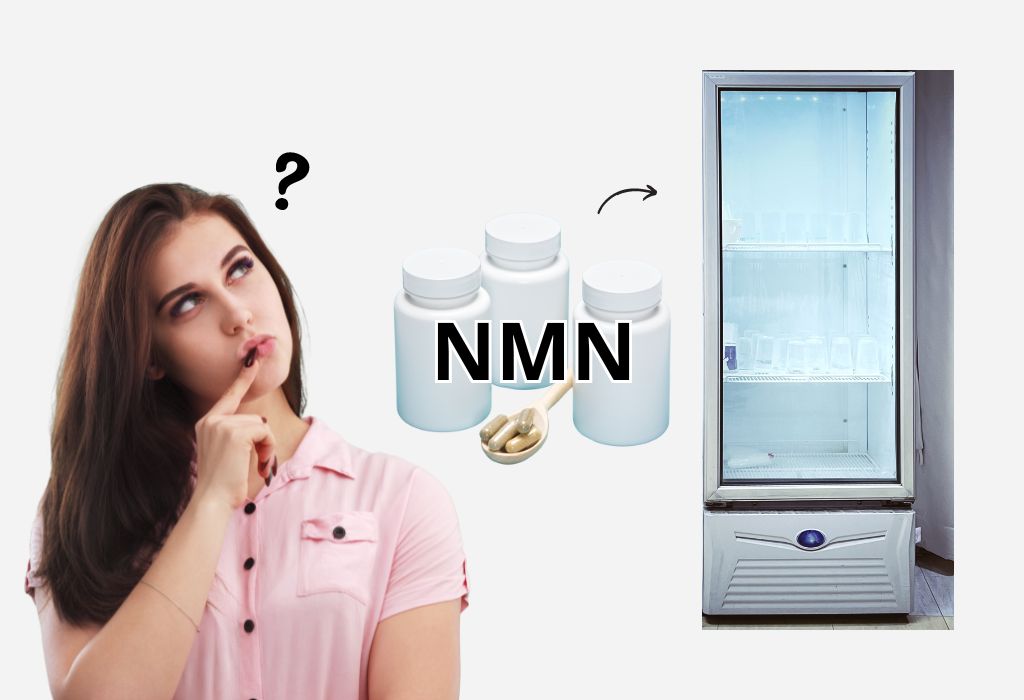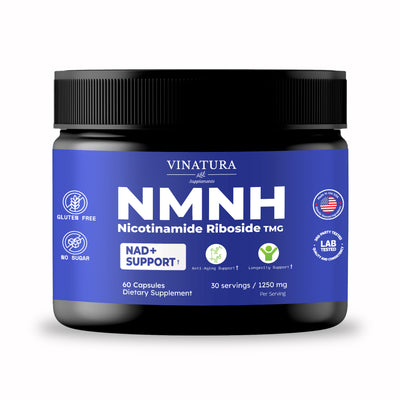
Should NMN Be Refrigerated? How to Store NMN?
NMN (Nicotinamide Mononucleotide) is a precursor to NAD+, which enhances energy metabolism and DNA repair. Besides being found in some foods like broccoli and avocado, NMN is now available in supplement form, raising concerns about properly storing NMN. So, should NMN be stored in the refrigerator? How should NMN be stored correctly? Follow this article to find out.
Before exploring further, please read the disclaimer located at the end of this webpage.
Key Takeaways
- NMN is a popular supplement known for improving health and longevity.
- Proper storage of NMN can significantly impact the product's effectiveness.
- Storing NMN in the refrigerator can be a good preservation method, but it depends on various factors.
Does NMN Expire?
NMN (nicotinamide mononucleotide) is a precursor to NAD+, an essential coenzyme involved in energy metabolism and DNA repair. A deficiency in NAD+ can lead to age-related health issues such as Alzheimer's and Parkinson's disease. NMN is present in some foods, such as broccoli and avocado. NAD+ levels decline as we age, making NAD+ supplementation necessary for the body [1].

Like many other supplements, NMN has an expiration date, and improper storage can reduce its effectiveness. While the expiration date is typically printed on the packaging, the way you store NMN can greatly affect the product's quality and longevity.

Factors Affect the Stability of NMN
Research has shown that several factors influence the stability of NMN, including [2]:
- Temperature: High temperatures accelerate the degradation of NMN.
- pH: Strongly acidic or basic environments can speed up the breakdown of NMN. In contrast, a neutral or slightly acidic/basic environment helps stabilize NMN.
- Enzymes: Pepsin and trypsin enzymes have little effect on the degradation rate of NMN.
- Humidity: Moisture can affect NMN, so avoiding humidity can help preserve it better.
- Storage conditions: Storing NMN at low temperatures and in a slightly acidic environment increases its durability during storage and use.
- Production quality: Some manufacturers have improved their technology to produce more stable NMN, but this is not fully guaranteed if proper storage methods are not followed.
Should NMN Be Refrigerated?
NMN can remain stable at room temperature (20-25°C) for a short period, but cold storage can extend its shelf life, especially in warm climates.
Storing compounds like NMN in the refrigerator can help slow down its degradation, allowing the product to maintain stability for a longer period.
This has been proven by research, which concluded that NMN should be stored cold. When kept at room temperature, NMN quickly loses stability. On the other hand, when stored at 4°C, NMN remains much more stable. Therefore, to ensure the quality and accuracy of the product, it is recommended to store NMN in a cold environment [3].

How to store NMN Properly?
To properly store NMN, you need to pay attention to the following details:
- Refrigeration: Store NMN in the refrigerator. As mentioned above, refrigeration can help keep NMN fresh.
- Cool and Dry: If a refrigerator is not available, store NMN in a dry, cool place away from direct sunlight.
- Keep Sealed: Ensure the container or bottle of NMN is tightly sealed to avoid moisture and air exposure.
- Avoid Heat: High temperatures are also detrimental to NMN, so avoid storing it in overly hot areas or near heat sources.
- Check Expiration Date: Always check the expiration date and use NMN before that time to ensure quality.
What Happens If You Use Outdated NMN Supplements?
NMN can expire—that's certain. Once NMN expires, its effectiveness may gradually decline, and it will no longer be as potent as it was before the expiration date.
Some opinions suggest that it may still be safe to use NMN if it has been stored in a dry place and hasn't been exposed to moisture. However, its effectiveness might not meet expectations. To minimize risks, some people consider combining NMN with other supplements that help boost NAD+. However, these claims have not been thoroughly researched and proven.
In general, using expired products will undoubtedly lead to changes in effectiveness, and it may have adverse effects on the body. Avoiding expired products is the best way to take care of your health.
If you have any doubts about using expired NMN, it's best to consult with a specialist or doctor to ensure safety and effectiveness.

How to Identify Outdated NMN Supplements?
The easiest way to identify expired NMN supplements is by noticing changes in color or smell. If your NMN pills were originally pure white but have now turned yellow or brown, this may indicate that the product has degraded. You should also pay attention to any unusual smells, as this can be a sign that your NMN has expired.
Additionally, expired NMN may become damp, clump together, or stick to each other. Be sure to inspect your NMN supplements for these conditions before using them.
If, during use, you no longer experience the benefits you once did, it could be a sign that the product has lost its effectiveness due to improper storage.
Things Need to Be Know When Storing NMN Supplements
To store NMN supplements properly, there are several important factors to keep in mind to ensure the quality and effectiveness of the product:
- Keep Cold: NMN needs to be stored in the refrigerator to prevent it from breaking down into nicotinamide, an unwanted compound.
- Avoid Moisture: Ensure that NMN stays dry. Moisture can reduce the product's effectiveness.
- Avoid High Temperatures: Don’t store NMN in hot places or direct sunlight. High temperatures can decrease the effectiveness of NMN.
- Check Packaging: Regularly monitor the condition of the packaging and the NMN itself to detect any early signs of degradation.
- Monitor Color, Smell, and Characteristics: If there is a noticeable change from the original state, the quality of the NMN has likely been compromised.
- Choose a Reliable Supplier: Select a supplier who ensures that the product is shipped and stored correctly.
Frequently Asked Questions
Does NMN Need To Be Kept Cold?
Yes. NMN does not have a long shelf life and needs to be refrigerated, much like probiotics, which must be shipped cold to maintain viability. However, not all NMN supplements need to be refrigerated, and there are other ways to store NMN.
Does NAD+ Need To Be Refrigerated?
Yes. Like NMN, NAD+ also needs to be stored in the refrigerator. Keeping NAD+ at a low temperature helps maintain its stability and effectiveness over time. If NAD+ is stored at room temperature or in hot, humid conditions, it may degrade and lose its effectiveness.
What Does NMN Degrade To?
NMN can break down into nicotinamide (a form of Vitamin B3), but this process only affects a small portion of the NMN.
Can Colder Temperatures Help Preserve NMN Supplements And Reduce Degradation?
Yes, cold temperatures can help preserve NMN supplements, reduce degradation, and maintain the product's quality and effectiveness.
Once NMN Is Refrigerated, Does It Need To Stay Cold At All Times?
Keeping NMN at a consistently cold temperature can ensure optimal quality. However, if NMN has been stored correctly in the refrigerator and is only temporarily brought out, such as for daily use, this shouldn’t cause significant harm.
Is Refrigeration Essential For Every NMN Supplement To Maintain Effectiveness?
Refrigeration isn’t necessary for all NMN supplements to maintain effectiveness. NMN can be stable at room temperature for short periods, but refrigeration can extend its shelf life, especially in warmer climates.
Do All NMN Supplements Need To Be Refrigerated To Extend Their Shelf Life?
Refrigeration is a great way to extend the shelf life of NMN. In many cases, NMN can be stable at room temperature if stored properly, away from direct light and moisture.
Conclusion
Properly checking and storing NMN supplements is crucial to ensuring safety and effectiveness. NMN should be stored in a dry place, away from light and high temperatures, and sometimes refrigeration is a good option. If NMN has expired, it’s best to stop using it immediately to avoid risks and contact the manufacturer for further advice. We hope this article has provided you with useful information.
References
- [1] NMN: Benefits, Side Effects And Dosage. Forbes. https://www.forbes.com/health/supplements/nicotinamide-mononucleotide/. Published July 23, 2024. Accessed August 29, 2024.
- [2] Liang Y, Li M, Tang Y, et al. Temperature-sensitive hydrogel dressing loaded with nicotinamide mononucleotide accelerating wound healing in diabetic mice. Biomedicine & Pharmacotherapy. 2023;167:115431-115431. doi:https://doi.org/10.1016/j.biopha.2023.115431
- [3] Danese E, Montagnana M, Brentegani C, Lippi G. Short-term stability of free metanephrines in plasma and whole blood. Clinical Chemistry and Laboratory Medicine (CCLM). 2019;58(5):753-757. doi:https://doi.org/10.1515/cclm-2019-0020
Author

Product Disclaimer
The dietary supplement products mentioned on this website are formulated based on scientific research and adhere to FDA guidelines for dietary supplements. However, the content of the articles has not been evaluated by the Food and Drug Administration (FDA) and is not intended to promote or endorse any specific product. Any products sold on this website are not intended to diagnose, treat, cure, or prevent any disease.
Opinions and Endorsements
Any claims, statements, or opinions expressed in the articles are those of the author(s) and do not necessarily reflect the views or opinions of the manufacturers of the dietary supplement products. The products sold on this website are separate from the content of the articles and are not directly endorsed or associated with the information presented here.
Liability Disclaimer
The author(s) of the articles, website, and manufacturers of the dietary supplement products do not assume any liability for any potential consequences arising from the use of the information provided in the articles. It is recommended that individuals consult with a qualified healthcare professional before making any dietary or lifestyle changes, including the use of dietary supplements.
Product Usage
Please refer to the product labels and packaging for specific usage instructions and guidelines for the dietary supplement products sold on this website.
Customer Support
For any concerns or questions regarding the dietary supplement products, please contact our customer support team, who will be more than happy to assist you.





Leave a Comment
Be the first to comment.
What do you think?